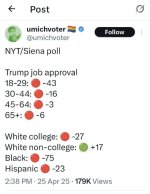Wait, now you're saying that wonderful American ingenuity isn't even capable of dealing with proper storm water drainage? No wonder you've lost your competitive edge to the Chinese!Yet you want Texas to do something about the flooding in Houston. Which has been happening since the North American Continent came into existence.
What about NOLA? Should they dam the river completely to prevent seasonal flooding from the Mississippi? Remember the city is built on the floodplain so the area needs that seasonal flooding for the plants and animals. And then let's talk about how your plan is going to allow transshipment of goods up the river into the interior of the US without increasing pollution levels.
And what about the Ganges in India? Same problem. Should India dam the river to prevent flooding at the expense of the planet? With the same pollution problem AND a bad effect on the religious ceremonies/bathing performed in the river.
Would either of those things cause more damage to the climate and society or be beneficial?
Your talk about New Orleans reminds me of the lord in Monty Python who built a castle, "Everyone said I was daft to build a castle on a swamp, but I built in all the same, just to show them. It sank into the swamp. So I built a second one. That sank into the swamp. So I built a third. That burned down, fell over, then sank into the swamp."
